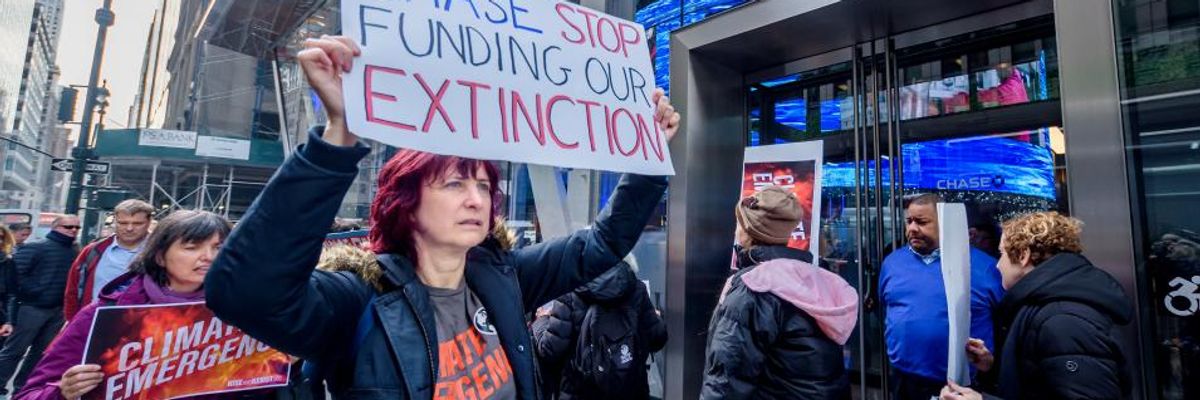Stop the Money Pipeline, a coalition that aims to end Wall Street's funding of climate destruction, is calling on Congress to hold the line against the financial industry--and give it no special deregulatory treatment--as the federal government responds to the economic fallout from the coronavirus.
"Now is not the time to relax rules on financial institutions' ability to weather future crises, particularly the climate crisis, the impacts of which continue to unfold even as we deal with COVID-19," Moira Birss, climate and finance director of Amazon Watch, said in a statement Friday.
"Instead, policymakers should be bolstering the resilience of the financial system to safely handle the climate shock that is barreling towards us," Birss added, "by requiring banks, asset managers, and other financial institutions to responsibly phase out financing and investments in fossil fuels and transition to a green economy."
President Donald Trump has already signed a pair of bills related to the pandemic and federal lawmakers are negotiating a third trillion-dollar coronavirus package. Trump and his allies are also pursuing a multibillion-dollar bailout of the U.S. oil industry, which has been impacted by the global outbreak and a price war.
"In this recovery we face a clear choice: bail out the fragile fossil financial system and lock in the next climate crash, or keep building a resilient green financial infrastructure that will serve as a stable foundation going forward," said Rainforest Action Network (RAN) climate and energy senior campaigner Jason Opena Disterhoft.
"Wall Street has already shown us they will choose profit over prudence," Opena Disterhoft continued. "Lawmakers, regulators, and civil society must ensure that we make the safe choice for all of our futures."
Specifically, Stop the Money Pipeline is calling for:
- Restricting the ability of financial institutions to invest in fossil fuel extraction and production.
- Repealing the authority for banks to own physical assets like oil refineries, pipelines, tankers, power plants, and coal mines and trade commodities, specifically including such fossil fuels as crude oil, fracked gas, and coal.
- Establishing a Community Climate Investment Mandate: Financial institutions with a federal charter have a duty to invest a certain percentage into climate change mitigation and resilience efforts.
- Incorporating climate risk into the prudential regulatory and supervisory framework for systemically important financial institutions.
The demands came just a few days after the release of Banking on Climate Change: Fossil Fuel Finance Report 2020--which, in the words of RAN climate and energy lead researcher Alison Kirsch, "paints a deeply disturbing picture of how financial institutions are driving us toward climate disaster."
The report, from RAN and other groups, found that since the 2015 Paris climate accord, 35 big banks have collectively poured $2.7 trillion into the fossil fuel industry. The top funder was JPMorgan Chase, a key target of Stop the Money Pipeline, at nearly $269 billion. Behind Chase were three other U.S. banks: Wells Fargo at $198 billion, Citi at $188 billion, and Bank of America at $157 billion.
Some of the environmental activists behind Stop the Money Pipeline's new demands for Congress highlighted the report's findings in their calls to action on the coronavirus.
"Big banks have continually increased their funding for fossil fuels in the years since the Paris agreement, putting our communities and our economy at risk of massive disruption due to climate change," said Sierra Club campaign representative Ben Cushing said. "As Washington and communities across the country are working to address the [COVID-19] pandemic, it's critical that Congress ensures that relief efforts go to protecting the most vulnerable and in need, not corporate polluters or those financing their operations."
Author and 350.org co-founder Bill McKibben was arrested while protesting at a Chase branch for the campaign's launch in January.
"Wall Street's record is horrible--they've been pouring money into fossil fuels even after the Paris climate accords," McKibben said Friday. "If bankers need the help of society, then society can demand that they commit to helping with the other grave crisis we face."
The calls for Congress to consider the climate crisis while addressing the COVID-19 pandemic aligned with comments from other activists in recent weeks, as the virus has infected over 258,000 people and led to over 11,000 deaths worldwide. As Common Dreams reported Wednesday, a growing chorus of advocates is urging political leaders to seize the opportunity to both revive the world's economy and battle the climate emergency by implementing a global Green New Deal.
